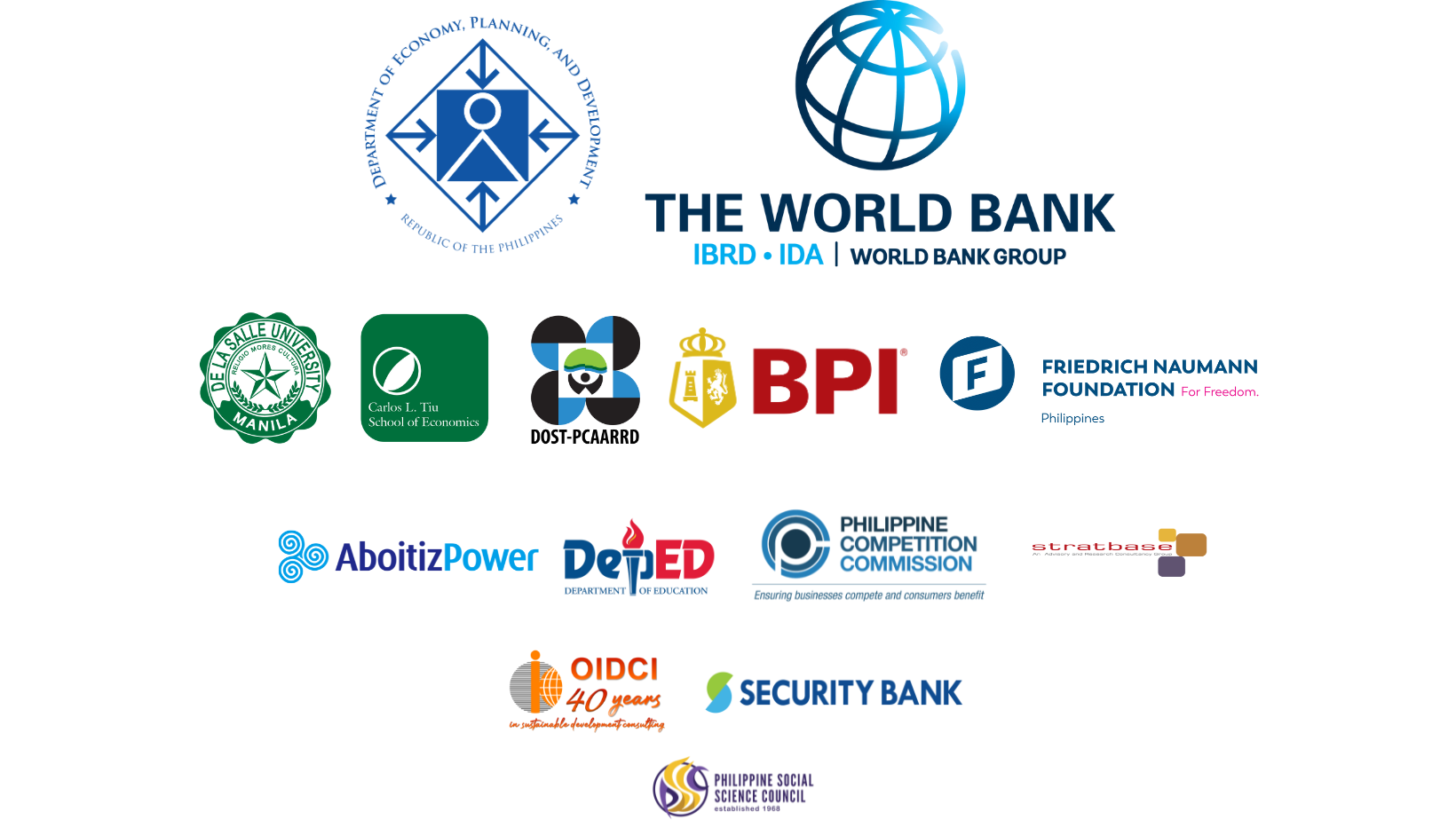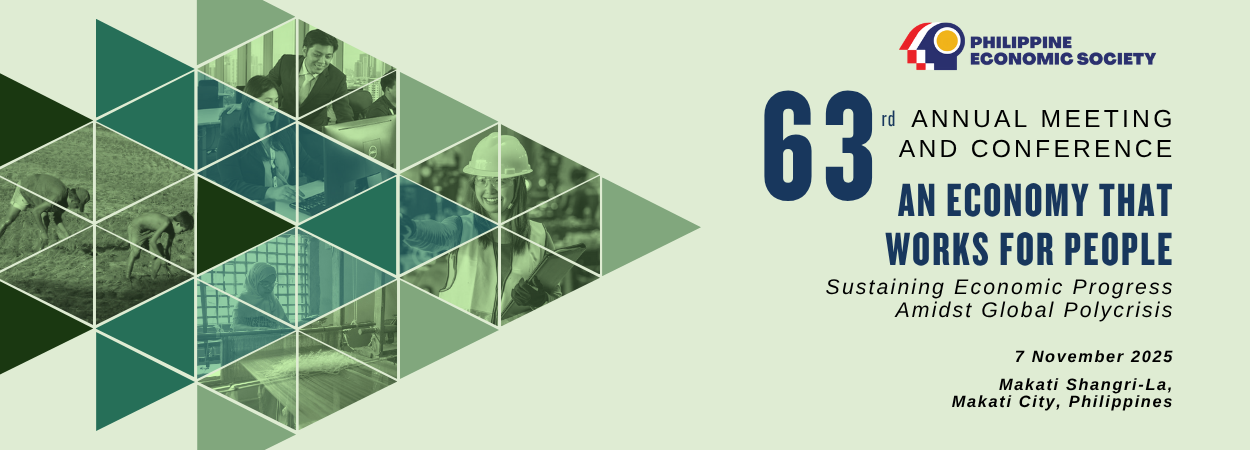An Economy that Works for People: Sustaining Economic Progress Amidst Global Polycrisis
7 November 2025 | Makati Shangri-La, Makati City, Philippines
The past few years have witnessed dramatic political upheavals that seem rooted, at least in part, in a deep sense of economic malaise. Even as the world has recovered from the epochal shock of the COVID-19 pandemic, longstanding discontent has re-emerged, and new uncertainties have cast a pall. Right-wing leaders have taken over governments in the Americas and Europe, while war continues in Ukraine, Palestine, and Sudan. Tensions continue in the West Philippine Sea and over Taiwan, even as the new President of the United States seems bent on disrupting global trade and American foreign aid. Economic disruption is also ripping through markets as advances in artificial intelligence threaten established employment structures. Finally, climate change continues to surprise in its speed and intensity, as wildfires become more frequent and widespread, and severe cyclones as well as El Niño episodes recur more often.
On the domestic front though has brought recent welcome news. Economic growth remains resilient, and unemployment continues to fall, dipping to 4.4% average for 2023, and further down to 3.25% by November 2024. Inflation softened to 3.2% in 2024, from an above-target rate of 6% in 2023. Poverty incidence declined to 15.5% in 2023, down from 18.1% post-pandemic. Beneath these figures, however, lies a dark underbelly. Past runups in the price of basic goods, especially rice, have spawned an affordability crisis, reflecting in the perceptions of people (and approval ratings of high government officials). Self-rated hunger last December 2024 was 25.9%, even higher than the pandemic quarter of July 2020 at 20.9%. Self-rated poverty reached 63%, the highest level since November 2003. The visible underemployment rate averaged 6.9% in 2024, highlighting the lack of decent jobs in the country. The low quality of jobs and the sense of hardship of daily life render hollow the seemingly favorable economic numbers. Even GDP growth weakened to a 5.6% average under the new administration is somewhat worrisome against the decadal average of 6.4%, pre-pandemic. Finally, fiscal policy faced pronounced difficulties as the government deficit remained at 5.1% of GDP, and the debt-to-GDP rose to 60.7%, far above the 34.1% before the pandemic, even a public outcry against fund misallocation led to delays in budget signing by the President.
What strategies are needed to meet these challenges? What kinds of industrial policies should be put in place – should the government engage in the “new industrial policy”, or adopt a more radical laissez-faire approach as in Argentina? How can growth be made inclusive, decent work become more accessible, and daily necessities more affordable? Within the context of a democracy, how can the State be reformed such that it ensures a functioning economy that works for people?
For inquiries:
The PES Secretariat
c/o Philippine Social Science Council
Tel No.: (632) 8-929-2671
Email: pes.eaea@gmail.com
Program and Speakers

Conference Registration
All plenary and breakout sessions of the conference will be held onsite.
The deadline for pre-registration is 2 November 2025. Walk-ins will still be accepted on the day of the conference.
How to Register
Step 1. Fill out the online registration form through the button below.
Step 2. Pay the corresponding registration fees.
The registration fees are as follows:
| Category | PES & EAEA Conferences | PES Conference | ||
|---|---|---|---|---|
| Early Bird* | Regular | Early Bird* | Regular | |
| PES members | PhP13,500 | PhP16,000 | PhP2,000 | PhP2,500 |
| Non-PES members | - | - | PhP4,500 | PhP5,000 |
| PES & EAEA members** | PhP10,500 | PhP13,000 | - | - |
| Non-PES & EAEA members | PhP13,500 | PhP16,000 | - | - |
| Undergraduate students | PhP8,500 | PhP10,000 | PhP750 | PhP1,000 |
* Early Bird rates are available until 16 August 2025
** Must be a member of both PES & EAEA
Payment options:
Pay online via PayPal or credit/debit card and send the payment confirmation to pes.eaea@gmail.com:
Pay through bank deposit/transfer and send a clear copy of the deposit slip to pes.eaea@gmail.com:
- Account name: Philippine Economic Society, Inc.
- Account number: 2281-0007-08
- Bank branch: BPI - U.P. Techno Hub
Pay in cash at the PES Secretariat office, c/o the Philippine Social Science Council Secretariat, 2/F PSSCenter, Commonwealth Avenue, Diliman, Quezon City.
Plenary Speakers
Keynote Presentation: The Philippine Economy - No Longer the East Asian Exception? Revisited
Abstract: The 2018 Clarete-Esguerra-Hill co-edited volume posed the question, is the Philippine economy "No Longer the East Asian Exception?" and answered in the affirmative: in the 21st century the Philippine economy has rejoined the East Asian mainstream, growing at similar rates to its neighbours. In the long sweep of Philippine economic history this is a significant achievement. But is it sufficient to enable the country to move through the ranks of the upper middle income economies and into the high income group? The answer to that question depends in part on whether the country can tackle some of the challenges addressed in this presentation.
Prof. Hal Hill is an emeritus professor of economics at the Australian National University. His main research interest is Southeast Asian economic development. He has also authored and edited 20 books and about 170 journal articles and book chapters. His first post-doctoral position was a memorable two years as a visiting assistant professor at the legendary UP School of Economics from 1980 to 1982. He also served on multiple boards and committees, including the East Asian Economic Association, where he served as President from 2020 to 2021. He also advised and consulted to well-known institutions such as the Australian Government, the Indonesian Government, the Asian Development Bank, the World Bank, and various United Nations agencies.
Closing Plenary Lecture: Reclaiming Development in the Age of Polycrisis: Rethinking the Roles of State, Markets, and Civil Society
Abstract: The lecture will review Southeast Asia’s shifting development trajectory since the end of the East Asian Miracle. It argues that the 1993 World Bank narrative—celebrating rapid growth via market-led reforms—masked regional variations and downplayed structural vulnerabilities. Southeast Asian development, although strong, has lagged behind that of Northeast Asia due to weaker industrial foundations, a heavier dependence on foreign direct investment, and deeper inequality rooted in historical and institutional differences.
The region’s adoption of financial liberalization and globalization, driven by faith rather than pragmatism, exposed it to volatile capital flows and crises, culminating in the 1997-98 financial crises. Instead of the promised benefits—efficient capital allocation and stability—the region saw asset bubbles, consumerism, and policy capture by vested interests. Ideologically driven neoliberal reforms eroded developmental state tools, prioritizing inflation control over employment and development.
Amid renewed global tensions, declining US imports from Asia, and China’s industrial dominance, Southeast Asian nations must rapidly adjust their policies to new challenges. The lecture calls for a developmental, pacifist and non-aligned regional stance—reviving ZOPFAN—to reclaim autonomy and resilience in an age of interlinked poly-crises.
Prof. Jomo Kwame Sundaram is a Research Adviser of the Khazanah Research Institute, a Fellow at the Academy of Science, Malaysia, and an Emeritus Professor at the University of Malaya. Aside from this, he also served as the UN Assistant Secretary-General for Economic Development, the Assistant Director General of the Food and Agriculture Organization (FAO), the Founder-Chair of the International Development Economics Associates (IDEAs), and President of the Malaysian Social Science Association. He has authored and edited over a hundred books, written many academic papers and media articles, besides translating 12 volumes. He also received several recognitions, including the Wassily Leontief Prize for Advancing the Frontiers of Economic Thought in 2007, The World Academy of Sciences (TWAS) Award in Social Sciences in 2026, and several honorary doctorates.
Call for Papers and Sessions
The PES invites individual papers and session proposals on all theoretical, empirical, and policy dimensions of the following sub-topics:
- Agriculture, food security, and rural development
- Business cycle and productivity analysis
- Competition and innovation frameworks and incentives
- Creative economy
- Digital economies
- Econometric models and applications
- Economics of gender
- Economics and other social sciences
- Economics of natural disasters
- Education, health, and human capital formation
- Energy economics
- Industry studies: public and transportation utilities
- Institutional economics, law and order, liability rules
- Labor economics
- Long-term planning, modeling, and economic forecasting
- Natural resources, environment, and sustainable economic development
- Poverty alleviation and social protection
- Public finance, monetary and financial economics
- Teaching of economics
- Trade and economic integration
Note: If you have a paper that does not clearly fit in any of these subtopics, you are still welcome to submit.
Submission of Proposals
All breakout sessions of the 63rd PES Annual Meeting and Conference will be held on-site at the Makati Shangri-La Hotel, Makati City, Philippines. Individuals or institutions interested in organizing breakout sessions must prepare proposals for a 1.5-hour session. Meanwhile, individual paper presenters will be grouped together into breakout sessions to be organized by the PES.
Individual paper submissions must include (1) a two-page executive summary of the paper containing the purpose of the research, method of data gathering and analysis, and overview of findings; and (2) a 150-word maximum abstract of the research paper.
Session organizers must submit a session proposal in one Word document file, which includes (1) the session title; (2) a 150-word maximum session abstract; (3) titles and abstracts of each paper presentation; and (4) the list of session participants (e.g., moderator, presenters, discussants), including their names, institutional affiliations, positions, and email addresses. You may download the session proposal template by clicking here.
Review and Acceptance of Proposals
All abstracts and sessions shall be reviewed by the PES Conference Scientific Committee and EAEA Secretariat (for submissions for PES & EAEA). PES shall issue notices of acceptance by 1 August 2025. Authors of accepted abstracts may also submit their full papers should they wish to be considered for possible publication in The Philippine Review of Economics journal.
Dates to Remember
| Deadline of submission of abstracts and session proposals | 31 May 2025 |
|
Notification of acceptance |
1 August 2025 |
| Deadline of confirmation of participation* | 31 August 2025 |
| Deadline of full paper submission** | 12 September 2025 |
| Conference date (63rd PES Annual Meeting and Conference) | 7 November 2025 |
| Conference dates (20th International Convention of EAEA) | 8-9 November 2025 |
* Only those who confirmed their participation and paid their registration fee will be included in the program.
** Submission of full paper is optional if the presenters wish to be considered for possible publication in The Philippine Review of Economics journal.
Hotel Accommodations
Makati Shangri-La Hotel
Attendees of the 63rd PES Annual Meeting and Conference may avail of the special room rate of PhP9,000 net/night for a Deluxe Room (single or double occupancy). To avail, please contact Ms. Ysabelle Cruz via email (ysabelle.cruz@shangri-la.com) with the subject line: Room Reservation for the 20th EAEA Participant. You may also reach her by phone at +632 8813 8888 loc. 7014.
For more information on the Makati Shangri-La Hotel, you may visit https://www.shangri-la.com/manila/makatishangrila/
 Philippine Economic Society (PES)
Philippine Economic Society (PES)

